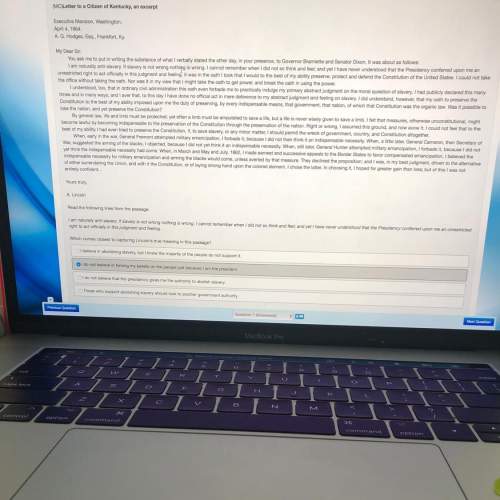(lc) letter to a citizen of kentucky, an excerpt

English, 02.09.2019 02:20 natalievick03
Question 1 multiple choice worth 4 points)
(lc) letter to a citizen of kentucky, an excerpt
executive mansion, washington,
april 4, 1864
a g. hodges, esq., frankfort, ky
my dear sir.
you ask me to put in writing the substance of what i verbally stated the other day, in your presence, to governor bramlette and senator dixon. it was about as follows:
i am naturally anti-slavery. if slavery is not wrong nothing is wrong. i cannot remember when i did not so think and feel and yet i have never understood that the presidency conferred upon me an
unrestricted right to act officially in this judgment and feeling. it was in the oath i took that i would to the best of my ability preserve, protect and defend the constitution of the united states. i could not take
the office without taking the oath nor was it in my view that i might take the oath to get power, and break the oath in using the power
i understood, too, that in ordinary civil administration this oath even forbade me to practically indulge my primary abstract judgment on the moral question of slavery. i had publicly declared this many
times and in many ways, and laver that, to this day i have done no official act in mere deference to my abstract judgment and feeling on slavery. i did understand, however, that my oath to preserve the
constitution to the best of my ability imposed upon me the duty of preserving, by every indispensable means that government, that nation, of which that constitution was the organic law. was it possible to
lose the nation, and yet preserve the constitution?
by general law, life and limb must be protected: yet ofton a limb must be amputated to save a life, but a life is never wisely given to save a limb. i felt that measures, otherwise unconstitutional, might
become lawful by becoming indispensable to the preservation of the constitution through the preservation of the nation. right or wrong. i assumed this ground, and now avow it. i could not feel that to the
best of my ability i had even tried to preserve the constitution, if, to save slavery, or any minor matter, i should permit the wreck of government, country, and constitution altogether.
when early in the war, general fremont attempted military emancipation, i forbade it, because i did not then think it an indispensable necessity. when, a little later, general cameron, then secretary of
war, suggested the arming of the blacks, i objected, because i did not yet think it an indispensable necessity. when, still later, general hunter attempted military emancipation, i forbade it, because i did not
yet think the indispensable necessity had come. when, in march and may and july, 1862, i made eamest and successive appeals to the border states to favor compensated emancipation, i believed the
indispensable necessity for military emancipation and arming the blacks would come, unless averted by that measure. they declined the proposition; and i was, in my best judgment, driven to the alternative
of either surrendering the union, and with it the constitution, or of laying strong hand upon the colored element. i chose the latter. in choosing it, i hoped for greater gain than loss; but of this i was not
entirely confident.
yours truly,
a lincoln
use context to determine the meaning of the words in bold.
i made a few angry gestures.
olmade several heartfelt requests.
i made two unenthusiastic attempts.
i made old-fashioned decisions.


Answers: 1


Another question on English

English, 21.06.2019 14:00
Which theme is best supported by the story the bachelor tells in “the storyteller”?
Answers: 3

English, 21.06.2019 18:30
Fill in the table with definitions of the literary techniques and concepts that occur in beowulf.
Answers: 1

English, 21.06.2019 19:00
Which techniques does president reagan use in this excerpt? select three options. pathos ethos shift understatement overstatement mark this and return save and exit
Answers: 1

English, 21.06.2019 19:50
Making an inference means filling in a text's missing information using context clues; drawing a conclusion means analyzing the story's ending. true or false? true false the inference statement is true, but the conclusion statement is false. the conclusion statement is true, but the inference statement is false.
Answers: 1
You know the right answer?
Question 1 multiple choice worth 4 points)
(lc) letter to a citizen of kentucky, an excerpt
(lc) letter to a citizen of kentucky, an excerpt
Questions

Computers and Technology, 07.08.2019 23:30

Computers and Technology, 07.08.2019 23:30

Computers and Technology, 07.08.2019 23:30

Computers and Technology, 07.08.2019 23:30

Computers and Technology, 07.08.2019 23:30

Computers and Technology, 07.08.2019 23:30

Computers and Technology, 07.08.2019 23:30

Computers and Technology, 07.08.2019 23:30

Computers and Technology, 07.08.2019 23:30

Computers and Technology, 07.08.2019 23:30

Computers and Technology, 07.08.2019 23:30

Computers and Technology, 07.08.2019 23:30

Computers and Technology, 07.08.2019 23:30

Computers and Technology, 07.08.2019 23:30

Computers and Technology, 07.08.2019 23:30

Computers and Technology, 07.08.2019 23:30

Computers and Technology, 07.08.2019 23:30

Computers and Technology, 07.08.2019 23:30

Computers and Technology, 07.08.2019 23:30

Computers and Technology, 07.08.2019 23:30



